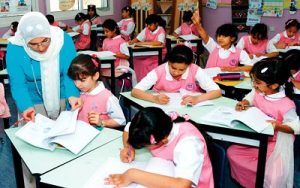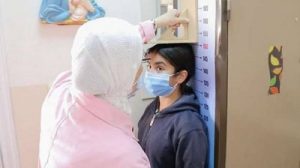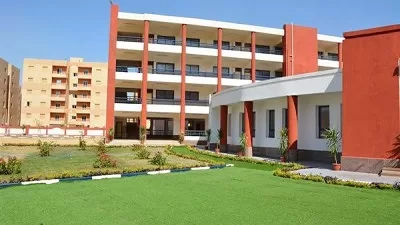Education in Egypt is like an ancient building that requires constant maintenance and refurbishing.
The government has regularly sought to develop basic education to ensure better learning and skills acquisition.
Civil society and non-governmental orgnisations intended to make learning a fun activity for children and young people away from the traditional methods to enrich social and cultural wellbeing.
“A safe learning environment, flexible learning techniques, performing arts in education and participatory management are key approaches for the success of children during study,” said educationist Ahmed Kameli.
He stressed the importance of instilling the values of learning to replace the traditional ideology that reduced the learning process to simply obtaining a certificate.
“There is an urgent need of community dialogue and surveys in the field of education development with a focus on discovering and nurturing talents, as the skilled students are the nation’s engine of progress,” Ali Nagui, a professor of physical education at the Faculty of Education, Benha University, told The Egyptian Gazette.
Nagui said that the government should pay more attention to improving the financial and social status of teachers, as they are the cornerstone of education.

Physical education
“Supporting schools to establish physical education daily can provide students with the ability and confidence to be physically active for a lifetime,” he said.
“The government is keen on developing the youth’s innovative capabilities across the country within the framework of localising the United Nations Sustainable Development Goals (SDGs) and Egypt’s Vision 2030,” Nagui added.
“Proper physical education at schools should involve checkups, nutritional guidance and developing the body with the aim of enhancing performance in class and behaviour outside school, as well as encouraging teamwork and social interaction,”Nagui told this paper.
In the meantime, he referred to the Education Ministry’s strategy to develop the technical education sector with the aim of transforming its curricula to a system based on the skills acquired by the graduate so that they can meet the needs of the labour market, in addition to presenting the experience of applied technology schools.
“The latest radical developments in education serve the state’s major national projects that to restore this country’s pioneering global status as well as its soft power across the Middle East and Africa,” Abdullah Mukhtar, a professor of curricula and methods of teaching at 6th October University, told The Gazette.
Mukhtar highlighted the praise of a number of global educational institutions on the Egyptian experience regarding revamping the education system over the past few years.
He said that more attention should be attached to overhaul the defects of educational system, stressing the need to rally efforts and join hands to meet the challenges and achieve the best solutions for problems facing educational process in government-run schools and universities.
The state seeks to develop the education system and overcome several challenges it faces; according to an ambitious plan that aims to raise the efficiency of schools, and integrate modern technology into the education process.
He said that the Ministry of Education should work more and exert extra efforts to revamp curricula and adopt new education systems that work on developing students’ skills, he told this paper.
Egypt rankings
Egypt has progressed in the Global Innovation Index (GII) three places during 2023, ranking 86th globally out of 132 countries, according to the report issued by the World Intellectual Property Organization (WIPO) for the year 2023 compared to 89th in 2022.
President of the Academy of Scientific Research and Technology Mahmoud Saqr has pointed out that Egypt’s ranking has advanced significantly in the Global Innovation Index in the last four years. Egypt advanced 10 places since 2020, where it was ranked 96th globally, then ranked 94th globally in 2021, and then ranked 89th globally in 2022, until it ranked 86th globally in 2023.
Partnering with foreign institutions
“The political leadership in Egypt was of the opinion that partnering one way or another with reputable foreign schools and universities could help with upgrading the quality of education. In parallel, there has been a consolidated effort to diversify the options of higher education,” according to education expert Mohamed Habib.
“The topography of the basic education and higher education system in Egypt has been evolving for the past two decades, with a big push for a major overhaul during the past few years,” he told this paper.
This, he said, had been all but inevitable, necessary, and overdue, either because new disciplines had to be introduced or because modern ways of teaching needed to be adopted to help graduates properly set out on an advancing, highly competitive, and extremely demanding labour market.
Habib said that teachers are the mainstay for developing education; hence the Ministry of Education is continuously paying more attention to training teachers on the new educational system to guarantee success. Habib hailed TV educational channels, describing them as a useful tool to help students and teachers understand the scientific materials.

Schools turn healthier as gov’t takes on several drives
State-owned schools are turning healthier as the government is moving ahead with several projects that aim to improve the health of pupils.
A recent statement by the Ministry of Health and Population said that Egyptian schools have been among the best five in Africa in applying international standards of promoting health.
The health-promoting standards were carried out in state-run schools in a number of provinces across the country in co-operation with the Ministry of Education and the World Health Organisation (WHO).
Health Ministry Spokesman Hossam Abdel Ghaffar said that field visits are conducted periodically to evaluate and follow up the implementation of these standards in the selected schools.
These measures aim to make the school a place that improves the health of children and limits harmful health practices, while following up on medical examinations, vaccinations, and proper nutrition for students as well as monitoring food requirements of school educators and urging students to follow healthy lifestyles and exercise sports activities.
According to the World Health Organisation, a health-promoting school is one that constantly strengthens its capacity as a healthy setting for living, learning and working.
These schools also strive to provide a healthy environment, school health education, and school health services along with school/community projects, create health promotion programmes for staff, nutrition and food safety programmes, opportunities for physical education and recreation, and programmes for counselling, social support and mental health promotion.
Health initiatives
Since 2014, the Egyptian government has been pushing ahead with projects to upgrade the health sector, announcing a package of urgent health measures to improve the health conditions of citizens, especially initiatives intended for pupils at state-run schools.
The ambitious plan included developing the health infrastructure through the implementation of the new comprehensive health insurance system in addition to a package of health reforms to accelerate the provision of service to citizens quickly in line with international quality standards.
The presidential initiative ‘100 Million Healthy Lives’ is one of the most important achievements in the health system, which has been a success in early monitoring and treatment of chronic diseases for all groups of the Egyptian people.
The initiatives also included the launch of the presidential initiative for early detection of anemia, obesity and stunting in February 2019.
More than 11.2 million primary students were examined out of a total of 15 million students targeted for the current academic year.
Developing universities
The state has attached paramount importance to the establishment and development of Egyptian universities and placing them in advanced global ranks compared to their counterparts in the world.
The development process came within the framework of efforts to upgrade the educational system at all levels, including university education, in a way that contributes to churning out qualified and trained human energies at the highest level that meet the aspirations of the state in fulfilling sustainable development.






Discussion about this post